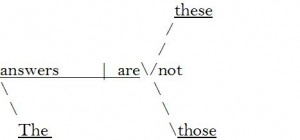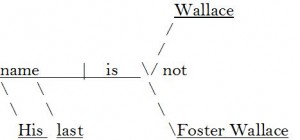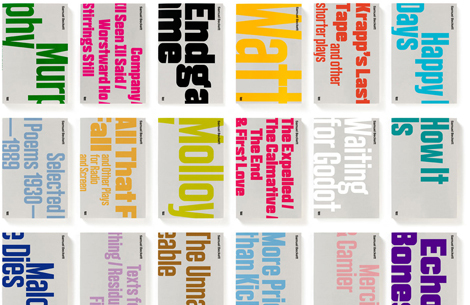STRANGE PLACES TO WRITE
I shot this video. And added the music! Thing is, I love the subway. I like to write on the subway.
On Teaching On Writing On Luck

I’m lucky.
Three days a week I get to stand in front of a classroom of students and talk about writing. I get to try new things and challenge what students understand about writing, words and knowledge. On the first day of class, we play with Legos and it completely blows my students’ minds that this is a serious college class where we’re going to do serious things in fun ways. I love teaching. It is awesome.
Teaching (writing) is hard and frustrating for so many reasons.
Grammar Challenge: Reiterations of Some Explanations in the Now-Unwieldy Comments Section
First, thanks so much to all of you who read/took/RT’d/linked to/commented on the Dave Wallace grammar challenge. I wanted to pay a small, quiet tribute to someone who did a great lot for me, and I am floored by the response. I’m beginning to feel like a broken record in the comments sections, though, as they are increasingly hard to navigate, and many readers have taken similar but separate umbrage with the idea of teaching or testing Standard Written English in the first place. Wallace addresses this in the essay I linked to in the answers post, but as the comments keep rolling in, I want to summarize some of what he taught me about this issue.
So. The quiz was intended to help writing workshop students spot errors w/r/t the current conventions of Standard Written English (SWE). The point is NOT to teach students to lord little rules over their friends; the point is to be more careful writers. And why does knowing the current conventions of SWE help us become careful writers?
Probably the most important reason is to avoid ambiguity. We want to make our meaning clear. Putting modifiers far from what they modify creates extra work for the reader, so we learn to spot this trouble area. Professor Wallace distinguished between good, rich ambiguity (even in grammar–cf the brilliantly dangling modifiers of Barry Hannah) and bad, distracting ambiguity, where we cause our reader to wonder whether we’ve made a calculated nonstandard choice (which is fine as long as our readers can tell) or merely don’t know the current accepted standards are in usage in grammar. He wanted us to avoid the latter kind of ambiguity. READ MORE >
Grammar Challenge: Answers and Explanations

The answers to the other night’s grammar challenge appear haphazardly throughout that post’s comments section, but it seems like people are still taking it, so I thought I’d hide the answers here under the fold for ease of checking.
Here is the essay “Tense Present: Democracy, English, and the Wars over Usage” that Wallace published in Harper’s in 2001. Those of you who give knowing the rules a bad name by correcting other people’s spoken and casual English really need to read this. So do those of you who think fiction writers and poets don’t need to know the rules. Both groups are lazy. It’s lazy to learn some rule in elementary school and continue to lord it over people while failing to pay attention to shifts in usage. And it’s lazy to distract readers unnecessarily because you don’t realize that your misplaced adverb causes ambiguity. Every writer would do well to invest in a copy of Garner’s Modern American Usage. I took quite the browbeating from Wallace before I bought mine for putting “over all” (should be one word) in a story. And yes, the shakedown took place in Footnote 7 in his letter of critique.
But Wallace would recommend another, older essay–the one that inspired his own subtitle, George Orwell’s “Politics and the English Language.” Read that here.
Answers to worksheet, once you’re ready, are below. READ MORE >
Grammar Challenge!

Seemed like people enjoyed talking about the finer points of grammar and usage a month or so back, so I thought I’d provide a little morsel from a nonfiction workshop I took in college taught by someone who, among other accomplishments, was the most obsessively precise user of English I have ever and will ever encounter. I have, or, well, had, David Foster Wallace to thank for my own peevishness about mistakes in what he called S.W.E., or Standard Written English. So what follows is the complete text of a worksheet from his class. Whoever can come up with the most correct corrections will win something (currently taking prize suggestions/donations). I’ll post the answers once it seems as if nobody is trying anymore. Don’t worry if someone else posts their answers first; they may not be right! Not as easy as it may first look. All sentences have one crucial error in punctuation, usage, or grammar. Okay go! ANSWERS HERE when you’re ready. And HERE is an explanation of why he took the trouble to teach us these conventions.
183D
25 February 2004
IF NO ONE HAS YET TAUGHT YOU HOW TO AVOID OR REPAIR CLAUSES LIKE THE FOLLOWING, YOU SHOULD, IN MY OPINION, THINK SERIOUSLY ABOUT SUING SOMEBODY, PERHAPS AS CO-PLAINTIFF WITH WHOEVER’S PAID YOUR TUITION
1. He and I hardly see one another.
2. I’d cringe at the naked vulnerability of his sentences left wandering around without periods and the ambiguity of his uncrossed “t”s.
3. My brother called to find out if I was over the flu yet.
4. I only spent six weeks in Napa.
5. In my own mind, I can understand why its implications may be somewhat threatening.
6. From whence had his new faith come?
7. Please spare me your arguments of why all religions are unfounded and contrived.
8. She didn’t seem to ever stop talking.
9. As the relationship progressed, I found her facial tic more and more aggravating.
10. The Book of Mormon gives an account of Christ’s ministry to the Nephites, which allegedly took place soon after Christ’s resurrection.
Writing/Editing Prompt: Kidnapping
 Step one: search through your files for two stories that don’t work. Find one that has a character you really like, but is otherwise uninteresting. Find another that works on a lot of levels, but is nonetheless dull.
Step one: search through your files for two stories that don’t work. Find one that has a character you really like, but is otherwise uninteresting. Find another that works on a lot of levels, but is nonetheless dull.
Step two: take the interesting character and place her/him in the other story in some awkward way. Force her/him into a confrontation with the characters in the well crafted but otherwise dull story. Let the character be aware that she/he is in some way out of place, but not necessarily in a meta “I’m a character in a story, but I think this is the wrong story” sort of way. Unless that is what you want to do.
Step three: watch as the character attempts to escape. Watch as the dull story attempts to hold the character in the story because the story prefers this new, interesting element to its original, dull cast.
Too Chic for Old Cranky
I like Beckett, and I like good design, but I don’t like these Beckett book covers:

(Click here and scroll to see them bigger at the site of their designer, A2/SW/HK.) These futuristic blocks don’t seem to bear out that modern chestnut at all. Am I right or am I right?
No Easy Cure for Novel-Nausea
 Zadie Smith has a long essay in The Guardian that is half about David Shields’s forthcoming, Reality Hunger: A Manifesto, and half about her own frustration with novel writing. Go read it. It’s longish, but it is completely worth the time. I am not going to include an excerpt here. Once you’ve read all of it, read the rest of this entry. READ MORE >
Zadie Smith has a long essay in The Guardian that is half about David Shields’s forthcoming, Reality Hunger: A Manifesto, and half about her own frustration with novel writing. Go read it. It’s longish, but it is completely worth the time. I am not going to include an excerpt here. Once you’ve read all of it, read the rest of this entry. READ MORE >
